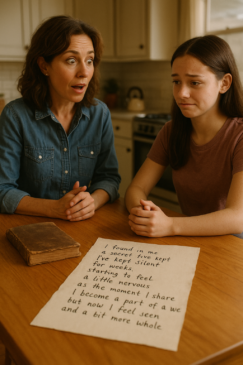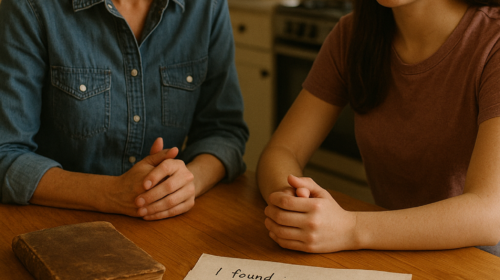When you become a parent, you expect to see bits of yourself in your child—a crooked smile, a stubborn streak, or even a shared taste in music. But I never expected to see my most private words echoed back at me, line for line, across a sheet of looseleaf at the kitchen table. The day my daughter, Anna, handed me her latest poem, pride quickly turned into something else: a swirling mix of shock, nostalgia, and vulnerability, as I realized she had borrowed—without asking—the deepest pieces of my heart.
The Assignment
It started with a school project. Anna, now fifteen and in full swing of her creative writing phase, was tasked with submitting a personal poem for her English class. For weeks, she’d been hunched over notebooks, chewing her pen and sighing at the blank page. “I want it to be real, Mom,” she said one night. “Not just made up. Something true.”
I told her to write what she knows, to listen for her own voice. I never imagined she’d end up using mine.
The Familiar Words
On a rainy Sunday morning, Anna slid a piece of paper across the breakfast table. “Can you read this before I turn it in?” she asked, cheeks pink with anticipation.
I read the first line, and my breath caught:
“I dream of oceans I’ve never seen—waves that pull me back to who I was.”

My heart thudded in my chest. That was from a diary entry I wrote at 22, after my first heartbreak. The next stanza was even more familiar:
“I am stitched together by memories, some fading, some sharp as the first cold day of autumn.”
One by one, the lines unfolded—images, phrases, and private aches I’d thought were mine alone. She had, somehow, found my old journals, and woven their contents into her poem.
The Confession
When I looked up, Anna was biting her lip, watching me closely. “It’s beautiful,” I said, my voice shaking. “But these words… where did you find them?”
She stared at her hands. “I found your diary in the closet last week. I just wanted to see what your handwriting looked like when you were young. But then I started reading, and it was… amazing. You felt things the way I feel them. I’m sorry, Mom. I didn’t think you’d mind if I borrowed a little.”
For a moment, I wasn’t sure whether to feel angry, exposed, or oddly flattered. My secret heartbreaks and small triumphs had been transformed by my daughter into something new—something both hers and mine.
Navigating Boundaries and Connection
I told Anna that I wished she’d asked before taking inspiration from my journals. “Those words were private,” I explained, gently. “They were written for me, in moments when I needed to figure things out. But I understand why they spoke to you. I’m glad you found comfort there—but it’s important to give credit and to ask before sharing someone else’s story.”
Anna apologized, wiping away a tear. “I just wanted to feel close to you. Your words made me feel like maybe I wasn’t so different from you after all.”
We talked about boundaries, about the difference between inspiration and permission, and about the gift—and responsibility—of telling your own story. I encouraged her to use her voice, even if it feels uncertain at first. “The world needs your poetry, Anna—not just mine.”
What I Learned
In that conversation, I realized how much our children crave connection—not just in the ways we show, but in the stories we keep hidden. I learned that vulnerability can be both a bridge and a boundary, and that sharing ourselves—carefully, intentionally—can create deeper bonds than we ever expected.
I also learned to forgive the trespass. In the end, Anna’s poem wasn’t just about stealing words; it was about reaching for understanding, about longing to belong.
Moving Forward
Anna rewrote her poem, keeping the essence but using her own words. She asked me to read it before she submitted it, and this time, I saw glimpses of my heart—filtered through her unique, fierce perspective. It was even better than before.
We made a pact: I’d share some of my old writing with her, when I was ready, and she’d always ask before using someone else’s story in her work. Our creative lives became something we could share, not something that had to be kept under lock and key.
Final Thought
If your child borrows your words without asking, let the moment be a chance for connection and honest conversation. The stories we write—on the page and in our lives—are sometimes the greatest legacy we can give.



